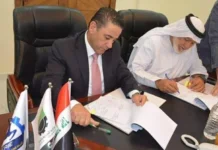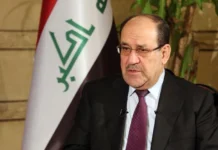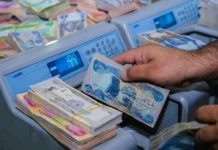Economist: The Decline In Citizens’ Purchasing Power Limits The Rise In The Exchange Rate
Time: 08/02/2025 15:27:56 Read: 585 times {Economic: Al-Furat News} Economic expert Salah Nouri confirmed today, Saturday, that the dollar exchange rates in the parallel market depend primarily on demand for trade purposes from neighboring countries.
He added in a statement by {Al-Furat News} that “demand depends on the purchasing power of the Iraqi citizen, and currently purchasing power is weak and the possibility of it continuing due to the financial crisis and the delay in disbursing salaries, which is a large segment”.
Nouri pointed out that “if the election campaign goes on its correct democratic path without exploiting public money or the flow of money from abroad, the price of the dollar will remain in its current state without an excessive rise”. https://alforatnews.iq/news/خبير-اقتصادي-تراجع-القدرة-الشرائية-للمواطن-يحد-من-ارتفاع-سعر-الصرف
Suspicious Platforms And A Market Without Laws Or Oversight… Cryptocurrencies Are Invading Iraq.
Baghdad Today – Baghdad At a time when the global shift to a digital economy is accelerating, Iraq is witnessing a significant increase in digital trading and cryptocurrency activity, amidst the absence of
regulatory legislation and a legal environment lacking the necessary controls.
Warnings of the worsening phenomenon are beginning to mount, especially with the expansion of unlicensed platforms and the increasing popular interest in these markets, which are described as complex and high-risk. Internationally, cryptocurrencies such as Bitcoin, Ethereum, and others have become part of the alternative financial ecosystem, used for trading, investments, and even cross-border transfers.
Although many countries have rushed to regulate this sector byenacting strict laws or adopting regulatory frameworks, Iraq remains a bystander, lacking clear legislation or a regulatory body for this activity.
With the increasing use of the internet and digital payment methods, economic analysts believe that
Iraqis are gradually entering the world of digital trading through global and local platforms, many of which lack any official licenses or legal oversight, exposing users to significant risks.
Speaking to Baghdad Today, economic affairs expert Nasser Al-Tamimi expressed his concern about the growth of digital trading in Iraq, noting that it has become a real threat on both the financial and social levels.
He said, “The rapid growth in the number of Iraqi traders, especially in the absence of legal regulation, is a dangerous gateway to financial fraud or even money laundering.”
Al-Tamimi asserts that “the state cannot remain a spectator to this ever-expanding digital financial phenomenon without taking action to establish clear controls and legislation that protect users’ rights and safeguard the national economy.”
He points out that some parties may exploit digital currencies as a tool for smuggling funds or circumventing sanctions, potentially exposing the country to international pressure.
According to observers, digital trading and cryptocurrencies pose a new challenge to the Iraqi economy, unexpectedly emerging amid a clear legislative vacuum and a risky environment.
While countries around the world are addressing this phenomenon from a precise regulatory and technical perspective, Iraq still lacks a legal and strategic vision for it. Al-Tamimi noted that
the very nature of the digital market, which is based on sharp and sudden fluctuations, could result in huge losses for unskilled users, especially with the promotion of a culture of “quick profit” without sufficient awareness of the risks.
In light of this situation, Al-Tamimi called for the formation of a specialized committee comprising experts from the financial, technical, and legal sectors.
This committee would be tasked with studying the reality of cryptocurrencies in Iraq and offering clear recommendations that would contribute to formulating a balanced legal framework.
According to Al-Tamimi, the required framework should “encourage innovation, but at the same time,
set barriers to abuse and protect society from potential negative repercussions.”
With the growing number of users and some platforms transforming into centers for collecting unsecured funds, there is a pressing need for urgent government action to regulate this sector, not only to protect citizens, but also to ensure that cryptocurrencies do not become a dangerous loophole in the country’s economic and security barrier. https://baghdadtoday.news/280042-.html
Iraqis Do Not Trust Banks. More Than 90% Of The Money Supply Is Outside The Banking System. Close Up
2025-08-02 02:58 Shafaq News – Baghdad The relationship between Iraqi citizens and banks, both governmental and private, remains isolated or nearly severed, especially when it comes to depositing money with these banks.
Citizens view these banks as deep wells that hide their money beneath the routine of lengthy transactions, while they see the rooms and closets of their homes as the safest places for their cash.
Citizen Wajdan Saleh is one of those people.
She is afraid to deposit her money in Iraqi banks and prefers to keep it at home, citing her fear that the banks will not easily return her money if she needs it.
“I once deposited 5 million dinars in a government bank, and when I went to withdraw it after a long period of time, they asked me to follow impossible procedures that took more than a week,” Wajdan told Shafaq News Agency.
Wajdan added that since then she has not deposited any money, even the remittances she receives from relatives outside Iraq, which she receives immediately upon arrival.
“The lack of trust between citizens and banks has led to citizens hoarding their money at home and not depositing it in banks, which has significantly impacted the monetary aggregate,” MP Mustafa Al-Karawi asserted.
He added, “The issue of developing the banking sector and merging banks has been raised repeatedly in parliament, and the primary reason behind this is the loss of confidence citizens have had in the banking system in Iraq.”
Speaking to Shafaq News, Al-Karawi explained that this problem stems from long-standing issues related to weak electronic and banking accounting systems, which has made citizens reluctant to use them and
prefer to withdraw their full salaries as soon as they are deposited into the card, leaving no balance.
He points out that the absence of modern banking systems has led people to refrain from depositing and saving in banks, which has led many to hoard their money at home, which in turn eads to economic stagnation and reduces the amount of liquidity circulating in the market.
Al-Karawi calls for raising citizens’ awareness and banking culture, as well as for government and commercial institutions and the private sector to adopt e-commerce transactions, as an important path to stimulating economic activity.
He concluded by saying that deposits in banks not only provide financial security for citizens, but also enable banks to provide development services such as loans and advances, which contribute to stimulating the market and achieving the desired economic growth.
Economist Dr. Ali Daadoush told Shafaq News Agency,
“The phenomenon of hoarding money amounts to 92% of the monetary mass outside the banking system. It represents a fundamental challenge to the monetary and financial structure in Iraq and
is one of the most prominent manifestations of the structural fragility of the monetary economy.”
He emphasized that “this phenomenon is complex and has behavioral, institutional, and economic dimensions.” He adds, “The culture of hoarding is not a new phenomenon.
It is an extension of decades of political and economic instability, from blockades to sanctions, from a lack of security to fragile institutions.
During these periods, the idea that paper money in your pocket is better than money in the bank became ingrained in the Iraqi mindset.
However, this culture did not remain within the framework of individual behavior alone, but rather transformed into a general phenomenon, stifling the economic cycle and weakening the ability of banks to perform their vital functions, from financing to investment, from oversight to the activation of monetary instruments.”
Daadoush points out that “the majority of those who hoard cash are individuals, particularly in small towns, rural areas, and areas not covered by banking services.
This is due to a lack of trust in banks, a result of past experiences of bankruptcy, seizure, or corruption, and the absence of a culture of financial inclusion in the educational and media systems.” Daadoush points to “the difficulty of banking procedures, the lack of widespread branch presence, and the
decline in digital banking services, which push people to cling to cash as an easier means of payment.”
According to experts, this phenomenon has many negative aspects, including the central bank losing effective control over the money supply, and its tools, such as interest rates and rediscounting, becoming less effective.
Meanwhile, banks suffer from a liquidity crunch, which weakens their ability to finance projects and pushes investors toward informal financing.
Furthermore, managing inflation due to the unofficial money supply negatively impacts the central bank’s decisions in achieving its primary objective of controlling the general price level and achieving stability.
Citizen Abdul Ali Alwan told Shafaq News Agency, “The procedures for opening a bank account require official identification documents and an amount not exceeding $100.
This is normal, but the problem becomes more complicated if we are asked to withdraw part of the deposited amount.” He added, “Routine procedures hinder the withdrawal process and take more than a week.”
Due to the instability and the closure of some private banks due to external sanctions, some people refuse to deposit money in these banks. Contractor Abdul Zahra Fadel explains, “There are often times when there is a quick and urgent need for money,but banking procedures stand in the way.
Some private banks are subject to sanctions that require them to shut down for a period of time, and
then we face numerous problems.”
He pointed out in an interview with Shafaq News Agency: “When a citizen opens a bank account in hard currency, the money transferred to him through the bank is not disbursed in the same currency,” noting that “the money transfer is also not delivered at the parallel rate under the pretext that the account opened with the bank is in hard currency, and another account must be opened in local currency in order to withdraw the transfer.”
He asserts that “banks in Baghdad adopt complex and often unreasonable procedures that place customers in prolonged suffering. This is completely different from the banks in the region,which enjoy ease and transparency in all their banking transactions.”
Ultimately, the Iraqi government must improve the administrative performance of banks and increase citizen confidence in the banking system by facilitating the procedures for withdrawing and depositing funds.
https://shafaq.com/ar/تقارير-وتحليلات/العراقيون-لا-ي-تمنون-البنوك-كثر-من-90-من-الكتلة-النقدية-خارج-النظام-المصرفي
For current and reliable Iraqi news please visit: https://www.bondladyscorner.com







